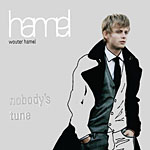Home » Jazz Musicians » Wouter Hamel
Wouter Hamel
Hamel’s songs are achingly catchy, or sometimes just aching. They often juxtapose deeply sad and even scathing lyrics with happy melodies that sweep you in. Imagine the musical landscape of a lush big band who would play with Frank Sinatra or Peggy Lee set against the emotional palette of Jeff Buckley...
Hamel is complex, seductive, clever. His songs reflect subtlety, anxiety, euphoria.
"But at the same time I would like to listen to PJ Harvey, Jeff Buckley, Peggy Lee, who is very sexy and strict and melancholic, but I also like Prince and Carmen McRae"
“By the time I was 17 and finished school I moved immediately out from my parents, not because I didn’t like them, but because I didn’t like the place they lived. I moved to the city of Utrecht.” He applied for a course in literature and journalism but left after the first year. “I was just interested in working for magazines like Vanity Fair and this course was very technical - how to write a news story.” He toyed with the idea of music school. He had guitar lessons and he was compulsively listening to Smashing Pumpkins. He wondered if music school would try to change the style before he had even developed it, but he was unhappy with journalism and decided to apply. “I wanted to make my voice bigger and learn theory so I could write songs. 120 people applied to music school and only four could be accepted, and I was, so that was quite an honour.”
Hamel did five years of music school from 1995-2001. “They did try to change me. Everyone who warned me was correct. But at the same time, what a blessing to do music every day. I came to the institute with this light airy voice. They tried to make me a crooner. I sang everything from old jazz to bossa nova. The drew out a voice that I had in me that perhaps I would never have known. It took me a while to learn what I should drop and what I should keep. It took me a while to redevelop my own style.” What he gained in knowledge he seemed to have lost in confidence. That feeling of knowing who he is in his own skin. When he left music school he began working as a singing teacher. It would be four years before his friends would even hear him sing. “My singing technique was really good. Because of all the singing lessons I gave people I learnt a lot, but I was really insecure. The new people I met never heard me play or sing. I didn’t go to jam sessions any more. One day I saw an advert in a newspaper for a Dutch jazz vocalist competition. I jokingly said I could win. I didn’t really believe I could...” But of course he did and he began to realise the conservatory had given him an amazing background. He didn’t have to sing jazz standards. “Gradually I got rid of my inhibitions and I began to write songs.”
Read moreTags
Wouter Hamel: Nobody's Tune

by Guy Zinger
Wouter Hamel is a young vocalist of Dutch origin, touring the world successfully with his laidback and velvety sound. He surrounds himself with pop harmonies and rhythm lines, bridging the gap between jazz and pop in his own special way. Nobody's Tune, his second CD, is a cross between the musical fields of The Beatles' Sgt. Pepper's Lonely Hearts Club Band (Apple, 1967) and a young crooner, with Hamel phrasing his songs and producing his lovely voice in a modern ...
Continue Reading












